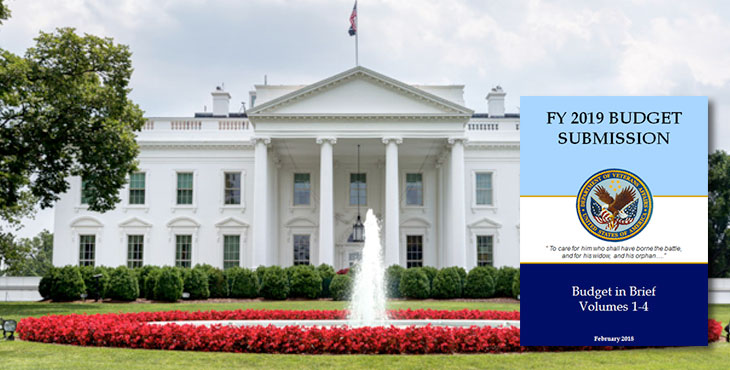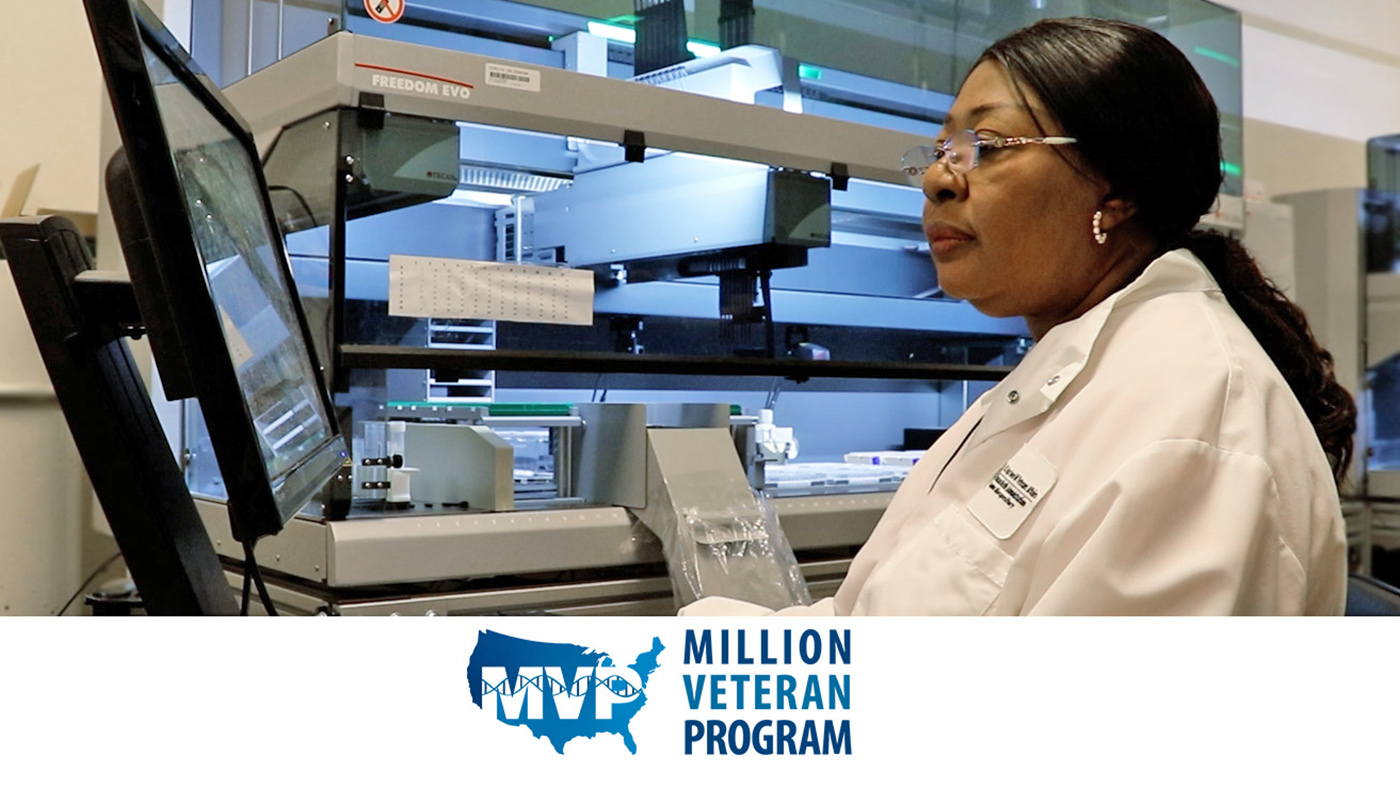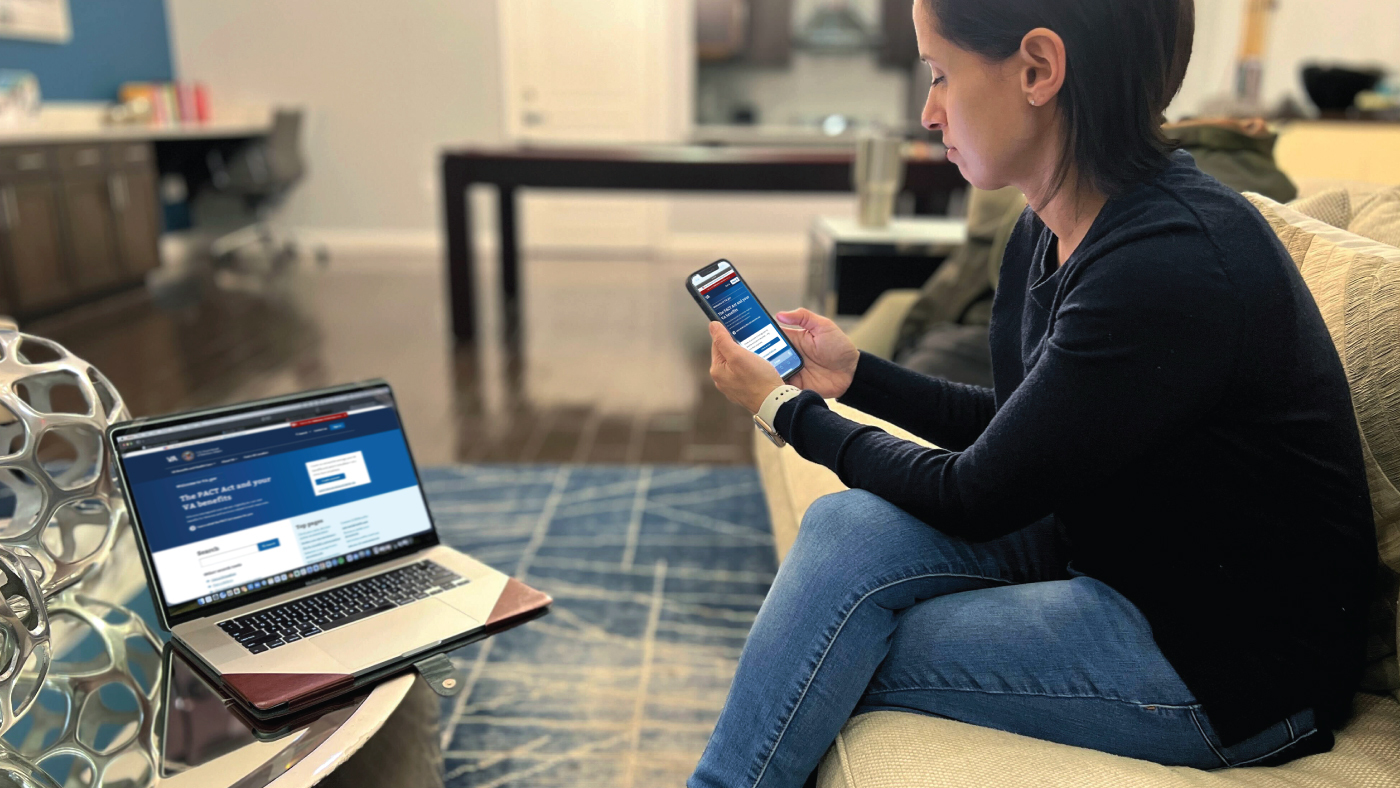In the fiscal year 2019 budget, President Trump is proposing a total of $198.6 billion for the Department of Veterans Affairs.
This request, an increase of $12.1 billion over 2018, will ensure the nation’s Veterans receive high-quality health care and timely access to benefits and services.
The budget also continues to implement reforms that will modernize VA and rebuild the full trust of Veterans.
“The 2019 budget reflects the strong commitment of the president to provide the services and benefits that our nation’s Veterans have earned,” said VA Secretary Dr. David J. Shulkin.
The FY 2019 budget prioritizes VA’s most urgent needs and incorporates internal offsets, modernization reforms and efficiencies to yield the greatest value to Veterans and taxpayers. The budget includes $88.9 billion in discretionary funding, including medical collections — $6.8 billion (8.3 percent) above the FY 2018 budget. The budget also includes $109.7 billion in mandatory funding for benefit programs, $5.3 billion (5.1 percent) above FY 2018.
Health Care
The FY 2019 budget medical care request of $76.5 billion, including collections, positions VA to continue expanding health-care services, improving quality and expanding choice to over 9 million enrolled Veterans. This request includes $1.8 billion for programs for homeless and at-risk Veterans, $382 million for opioid treatment and pain management safety, $511 million for gender-specific health-care services for women and $510 million for caregivers’ benefits. The requested $727 million for medical and prosthetic research, $87 million above the FY 2018 budget, will support an estimated 2,200 projects. VA will continue to focus on critical areas, such as mental health, pain management, prosthetics and the Million Veteran Program.
Suicide prevention is VA’s highest clinical priority. The request of $8.6 billion for mental health services, $468 million (5.8 percent) above 2018, supports standardized suicide screening and risk assessments and expands options for post-traumatic stress disorder treatment. The budget also funds emergent mental health services to certain former service members with other than honorable administrative discharges, and it supports President Trump’s commitment to provide access to mental health treatment and suicide prevention resources for transitioning service members in the year following their discharge, separation or retirement, as directed by executive order.
“Veterans deserve greater access, choice and control over their health care,” Shulkin said.
VA is committed to strengthening and supporting VA’s capacity for the direct delivery of health care through the reforms proposed in the administration’s Veterans Coordinated Access & Rewarding Experiences (CARE) proposal, transmitted to Congress last fall. The FY 2019 budget sustains the administration’s commitment to VA’s community care program and includes a total program level of $14.2 billion, 9.1 percent above 2018, after adjusting for a change in timing of obligations.
Veterans’ Benefits
VA’s FY 2019 budget request includes $2.9 billion for the Veterans Benefits Administration (VBA) to administer the distribution of $116.9 billion in obligations for timely benefits and quality services to Veterans and other beneficiaries. Notably, the budget will enable VBA to process 1.3 million Veteran disability compensation rating claims, 4.5 million education claims and 2.9 million home loan guarantees for borrowers. The request also supports VA’s implementation of the historic Veterans Appeals Improvement and Modernization Act of 2017, overhauling VA’s appeals process. The new process empowers Veterans by providing them with the ability to tailor the process to meet their individual needs and enables VA to provide more timely resolution of their appeal.
Information Technology
The FY 2019 Budget requests $4.2 billion for information technology (IT), $129 million above the FY 2018 Budget, to modernize systems and services and enhance the IT infrastructure. This request includes $381 million for development projects such as modernization of legacy systems; development of a Digital Health Platform, and a new Financial Management System.
Electronic Health Record Modernization
The FY 2019 budget also requests $1.2 billion to continue implementation of a single, accurate, lifetime Electronic Health Record (EHR) that will improve VA services and significantly enhance the safety and coordination of care for Veterans who receive medical care, not only from VA, but the Department of Defense and community partners.
Other Key Services for Veterans
- $1.8 billion for major and minor construction projects, including a new spinal cord injury unit in Dallas, Texas; construction of a community-based outpatient clinic and renovation of domiciliary in Canandaigua, New York, and cemetery expansions at the St. Louis medical facility (Jefferson Barracks); Rittman, Ohio; Mims, Florida; and Holly, Michigan.
- $315.8 million to administer VA’s system of 139 national cemeteries, including funding for the activation of nine new cemeteries, which will open in 2019 and 2020.
- $172.1 million for the Office of Inspector General to enhance oversight.
Enhanced Oversight of VA’s programs
The budget focuses resources more efficiently and prioritizes foundational services in VA’s system while more smartly and better utilizing the private sector. The budget holds leaders and employees accountable for poor performance and misconduct.
Over the past eight months, VA has removed more than 1,300 staff and placed almost 500 staff on suspension. In addition, the budget expands the STOP Fraud, Waste and Abuse initiative, using best practices from the private and public sectors to reduce fraud and waste. In conclusion, the FY 2019 President’s Budget continues to implement reforms that modernize VA’s culture, processes and capabilities — putting the needs, expectations and interests of Veterans first.
Topics in this story
More Stories
Seven U.S. Army soldiers, one Army Reserve soldier and two Veterans are representing Team USA at the 2024 Olympic Games in Paris, which begins today.
The findings of this new MVP study underscore the importance and positive impact of diverse representation in genetic research, paving the way for significant advances in health care tailored to Veteran population-specific needs.
VA reduces complexity for Veterans, beneficiaries, and caregivers signing in to VA.gov, VA’s official mobile app, and other VA online services while continuing to secure Veteran data.







I hope some of this money will help people that are more than 40 miles from a VA Hospital, like myself last year. Just about all my requests for payment after I was approved to go to a hospital over the phone have been denied. There is a catch 22 built into the program. I’m sure I’m not alone. Had I tried to make it to the VA hospital “I WOULD BE DEAD”. I have gone to my congress people with little result. Hopefully this will change. Also have gone to the DAV.waiting results. If nothing works I will go to the media. The Lawyers in the area are not equipped to go after the VA.
Well here it is I provide 24 hour care to my father who suffers with lots of pain to his lower back and and a stroke in 2004 that left him unable to balance in stand. My father also suffers with PTSD. I bathed dress undress prepare 3 meals daily transport him to all appointments and I do all his errands medication reminders laundry and provide a roof over his head lights water etc., yet the Veterans affairs denied aid and attendance care for me and want to say my father only other option is a nursing home. Its really sad when family cannot be compensated yet they ( the VA ) will pay an outsidecagency to come into my home 3 days out of week to do what I do everyday for 4 hours my father gets bathed twice daily by me his daughter. His doctor stated my father has to have 24 hour care due he falls a lot and needs to be monitored. I also provide ROM bllod pressure temperature etc., why is it I as my fathers care provider cannot receive aid and attendance pay. The laws must not apply for my veteran father.
I don’t see anything regarding homeless Veterans in this announcement. What is the President’s plan for future dollars dedicated toward reaching the goal of ending Veteran homelessness….what we are doing is working, there is still work to be done.
oops! there it is….1.8 billion….
I go to Northport VAMC for my care. I have learned from talking to people who work there that when someone retires no one is hired to replace them. This means quite a few things are not getting done. The lobby floors use to be cleaned every day and buffed twice a month. Now nothing. The tables in the lobby where people sit to relax and have coffee and something to eat are like a ship on the water, rocking back and forth. Too many times I have seen cups of coffee or tea spill because of the rocking. This stuff could really burn someone. Something has to be done it really demoralizes fellow vets.